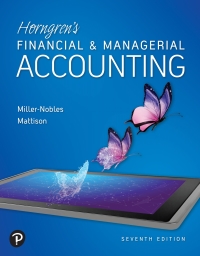Answered step by step
Verified Expert Solution
Question
1 Approved Answer
Dividends A distribution by a corporation to a shareholder with respect to its stock will constitute a capital gain to a shareholder: Only when there
Dividends
- A distribution by a corporation to a shareholder with respect to its stock will constitute a capital gain to a shareholder:
- Only when there are earnings and profits of a corporation
- Only when there are no earnings and profits of a corporation
- To the extent of the shareholders basis in the stock
- To the extent a distribution exceeds a shareholders basis in his stock
- If a corporation has current year earnings and profits and negative accumulated earnings and profits a distribution by a corporation to a shareholder with respect to its stock will:
- Be a divided to the extent of the sum of the current and accumulated earnings and profits
- Be a dividend to the extent of the accumulated earnings and profits
- Be a dividend to the extent of the current earnings and profits
- Be a dividend to the extent of the accumulated earnings and profits and current earnings and profits where the current earnings and profits are prorated to the date of distribution
- If a corporation has a current year loss in earnings and profits and accumulated earnings and profits a distribution by a corporation to a shareholder with respect to its stock will:
- Be a divided to the extent of the sum of the current and accumulated earnings and profits
- Be a dividend to the extent of the accumulated earnings and profits
- Be a dividend to the extent of the current earnings and profits
- Be a dividend to the extent of the accumulated earnings and profits and current earnings and profits where the current earnings and profits are prorated to the date of distribution
- Certain items deducted in computing a corporation's current year taxable income are added back to compute earnings and profits because:
- They represent deductions to be taken in a future year
- They were already deducted in computing taxable income
- They represent actual cash expenditures of the corporation in the current year
- They do not represent actual expenses or expenditures paid for by the corporation in the current year
- On a nonliquiddating distribution of appreciated property and depreciated property to a shareholder in corporation will recognize:
- Loss but no gain
- Gain but not loss
- Gain and loss
- Neither gain nor loss
- On a nonliquidating distribution of appreciated property subject to debt, in terms of computing the corporations gain, if any:
- The fair market value used by the corporation in measuring its gain will always be less than the debt
- The fair market value used by the corporation in measuring its gain cannot be more than the debt
- The fair market value used by the corporation in measuring its gain cannot be less than the debt
- Their fair market value is not impacted by the amount of the debt
- On a nonliquidating distribution of appreciated property subject to debt, in terms of computing the shareholders dividend:
- The fair market value is the amount of the distribution to the shareholder
- The fair market value less the debt is the amount of the distribution to the shareholder
- The fair market value plus the debt is the amount of the distribution
- The amount of the distribution depends on the amount of earnings and profits
Step by Step Solution
There are 3 Steps involved in it
Step: 1

Get Instant Access to Expert-Tailored Solutions
See step-by-step solutions with expert insights and AI powered tools for academic success
Step: 2

Step: 3

Ace Your Homework with AI
Get the answers you need in no time with our AI-driven, step-by-step assistance
Get Started


